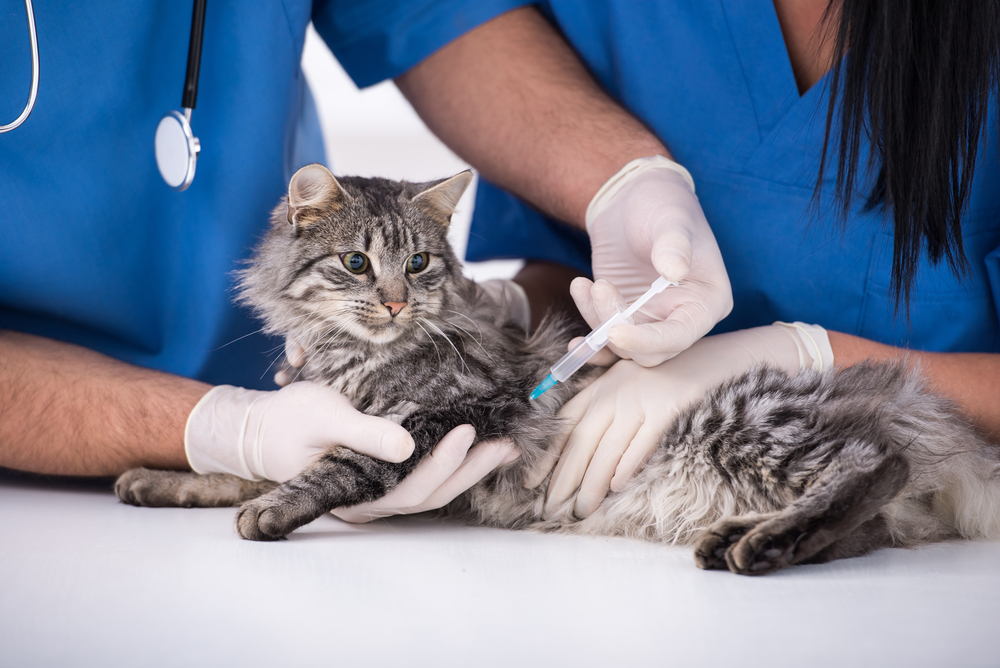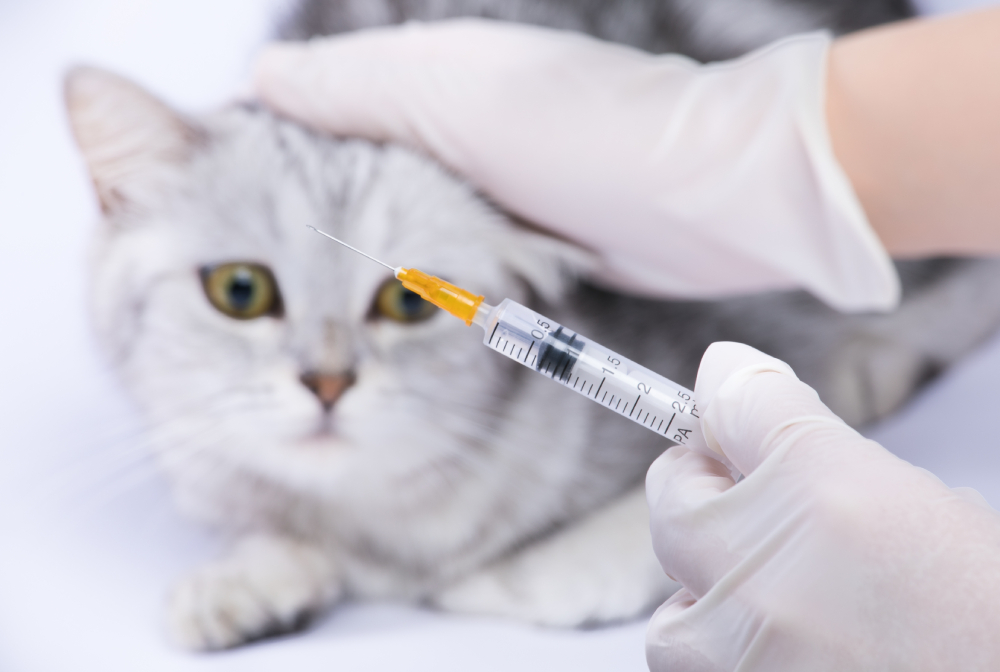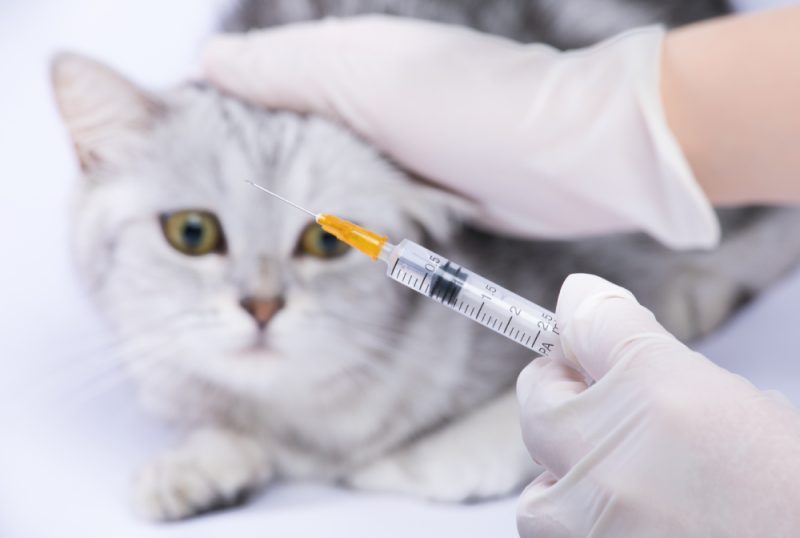Click to Skip Ahead
Vaccinations are crucial to protect your cats from disease. Arguably, one of the most important vaccines for cats is rabies. It’s not only required by law in many states and jurisdictions, but it’s the best defense against a devastating virus that has no treatment.
Fortunately, rabies vaccines are relatively inexpensive at a vet or low-cost clinic. Here’s how much a rabies shot for a cat costs.
The Importance of Rabies Shots
Rabies is a viral disease that attacks the central nervous system of mammals, including cats, dogs, humans, and wildlife like foxes, coyotes, raccoons, and bats. It’s transmitted through the saliva of an infected animal, usually through a bite. When cats get rabies, it often comes from being bitten by an infected wild animal.
Once an animal contracts rabies and shows signs, which can include aggression, fearfulness, excessive drooling, progressive paralysis, seizures, and light sensitivity, there is no treatment. Fortunately, the disease has been virtually eradicated in developed countries because of the availability of the rabies vaccine.
Prior to 1960, most animal rabies cases reported to the CDC were domestic pets. Now, more than 90% of animal cases are wildlife. Rabies-related human deaths have also declined with the availability of the vaccine. In the early 1900s, more than 100 cases were reported annually. Now, it’s just one or two each year.

How Much Does a Rabies Shot Cost?
The rabies vaccine for a cat is between $20 and $30, but it can cost as little as $10. Vaccination costs are rising along with inflation, so you can expect to pay more for a rabies shot than just a few years ago. In addition, areas with higher costs of living, like cities, are often more expensive than a more rural or small-town clinic.
Some animal shelters, pet advocacy groups, and chain pet supply stores have low-cost or free vaccination clinics. Nonprofit organizations may also have pop-up vaccination events in different neighborhoods near you, which include rabies, other core vaccines, microchipping, and spaying or neutering. Some vet schools also run low-cost clinics for pet owners.
Additional Costs to Anticipate
However, some vets—particularly in expensive metropolitan areas like Miami, New York, and Los Angeles—may charge an exam fee or office visit along with the vaccine, which can add to the costs. The exam fee can also vary but may fall between $40 and $80, depending on the specific clinic.
While you can get a rabies shot on its own, they’re usually given as part of your cat’s core vaccines and wellness checkup. These vaccines include feline herpesvirus, calicivirus, and panleukopenia (FVRCP). Your vet may recommend additional vaccines based on your geographic region and your cat’s likely risks as well, which may raise the costs.

How Often Should I Vaccinate My Cat for Rabies?
Different states have different laws and recommendations for when kittens should first be vaccinated for rabies. Typically, it is when they are around three to four months old. After that, your cat can get a rabies vaccine every year or every three years, depending on the version of the vaccine you choose.
If your cat gets into a tussle with a wild animal or a feral cat, you may need to get a rabies booster to ensure they’re protected. There’s no treatment for rabies once signs start but administering the vaccine after a bite can be effective at preventing the disease. Rabies has a long incubation period between exposure and the onset of signs, which can be weeks or months.
If you’re not sure when your cat should have the rabies shot or if they’ve been exposed to saliva from a wild animal, speak to your vet for recommendations.
Does Pet Insurance Cover Rabies Vaccines?
Most basic pet insurance plans only cover accidental injuries and certain illnesses with exclusions and limits. They typically don’t include preventative care, vaccines, or other medical services.
However, some companies offer additional coverage or riders for preventative care and wellness, which may include rabies vaccines and other core vaccines. This will likely add to the monthly premium, but it can help you spread out the cost of your cat’s wellness care over time.

What Other Vaccines Does My Cat Need?
Rabies vaccines are necessary to abide by local laws and prevent your cat from contracting this serious, untreatable virus. Even indoor cats need a rabies vaccine, as they can get outside accidentally and come in contact with infected wildlife. Sometimes, rabid wildlife can get in, such as bats coming into your attic or a raccoon in the basement, exposing your cat to risk.
In addition, your cat will need the FVRCP combination vaccine to prevent other common illnesses in cats, such as herpes and leukemia. Otherwise, your vet may recommend specific vaccines based on your cat’s lifestyle and local disease risks. You should also use preventative medication for fleas, ticks, and other parasites, and your cat should be spayed or neutered to prevent accidental litters.
Conclusion
The rabies vaccine is legally required, but it’s also crucial to prevent disease in your cat. Once rabies signs show, there’s no treatment to cure the disease. Fortunately, rabies vaccines are widely available, given on yearly or three-year schedules, and relatively inexpensive. If you’re having financial difficulty, vaccine clinics from animal shelters, pet stores, and nonprofit organizations often offer free or low-cost rabies shots and other veterinary care.
Featured Image Credit: HelloRF Zcool, Shutterstock












